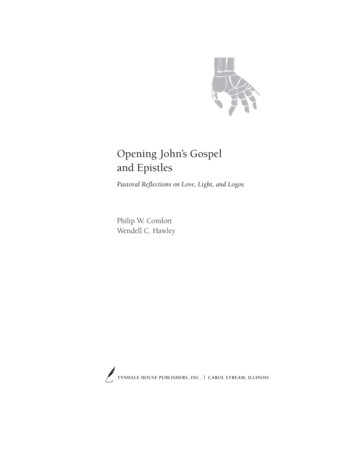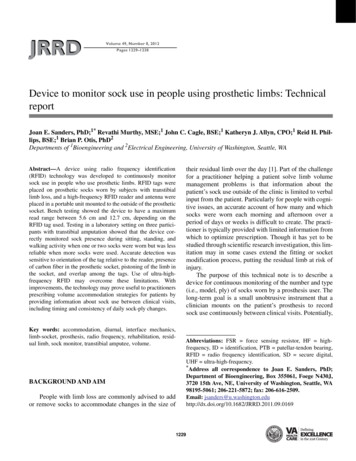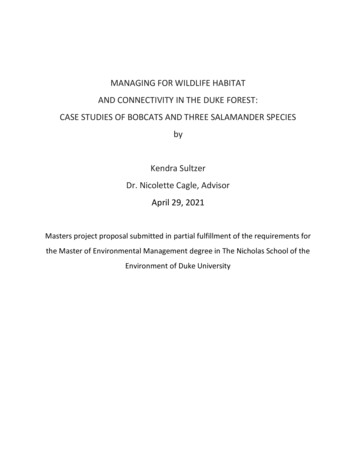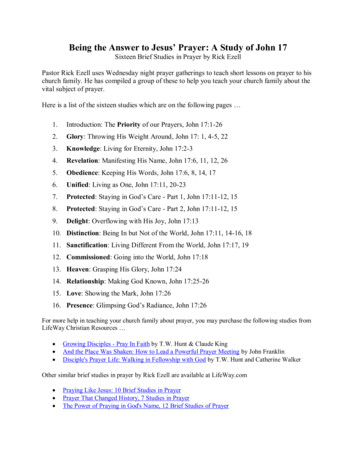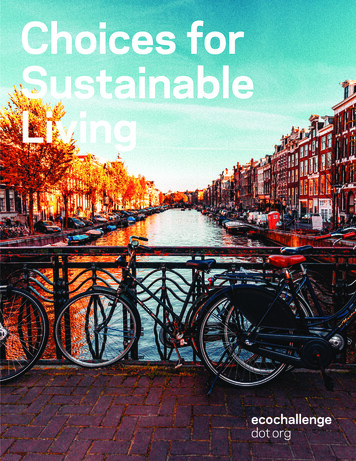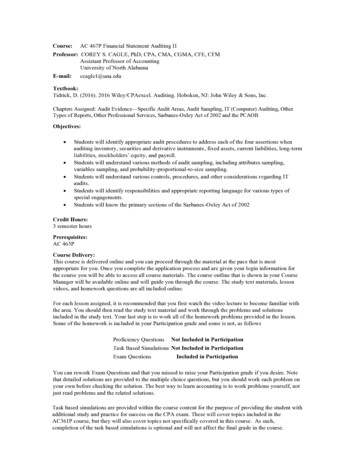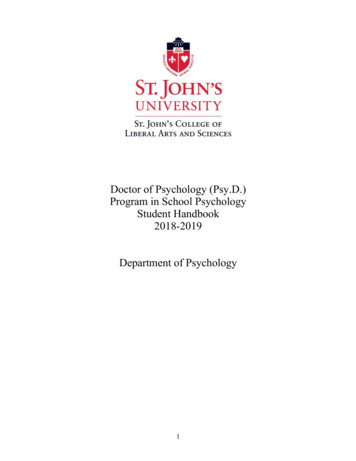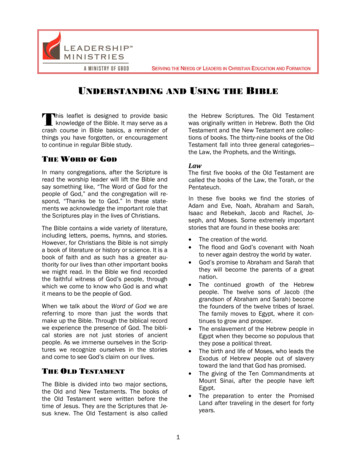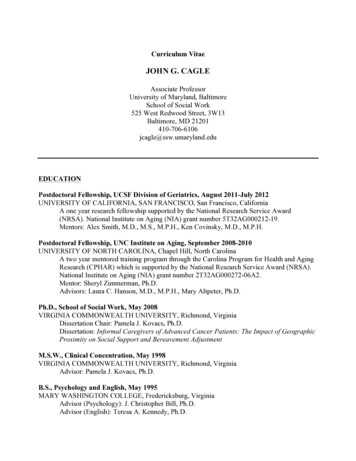
Transcription
Curriculum VitaeJOHN G. CAGLEAssociate ProfessorUniversity of Maryland, BaltimoreSchool of Social Work525 West Redwood Street, 3W13Baltimore, MD Postdoctoral Fellowship, UCSF Division of Geriatrics, August 2011-July 2012UNIVERSITY OF CALIFORNIA, SAN FRANCISCO, San Francisco, CaliforniaA one year research fellowship supported by the National Research Service Award(NRSA). National Institute on Aging (NIA) grant number 5T32AG000212-19.Mentors: Alex Smith, M.D., M.S., M.P.H., Ken Covinsky, M.D., M.P.H.Postdoctoral Fellowship, UNC Institute on Aging, September 2008-2010UNIVERSITY OF NORTH CAROLINA, Chapel Hill, North CarolinaA two year mentored training program through the Carolina Program for Health and AgingResearch (CPHAR) which is supported by the National Research Service Award (NRSA).National Institute on Aging (NIA) grant number 2T32AG000272-06A2.Mentor: Sheryl Zimmerman, Ph.D.Advisors: Laura C. Hanson, M.D., M.P.H., Mary Altpeter, Ph.D.Ph.D., School of Social Work, May 2008VIRGINIA COMMONWEALTH UNIVERSITY, Richmond, VirginiaDissertation Chair: Pamela J. Kovacs, Ph.D.Dissertation: Informal Caregivers of Advanced Cancer Patients: The Impact of GeographicProximity on Social Support and Bereavement AdjustmentM.S.W., Clinical Concentration, May 1998VIRGINIA COMMONWEALTH UNIVERSITY, Richmond, VirginiaAdvisor: Pamela J. Kovacs, Ph.D.B.S., Psychology and English, May 1995MARY WASHINGTON COLLEGE, Fredericksburg, VirginiaAdvisor (Psychology): J. Christopher Bill, Ph.D.Advisor (English): Teresa A. Kennedy, Ph.D.
2ADDITIONAL EDUCATIONPalliative Care Research Cooperative Group (PCRC) Palliative Care Clinical Trials Intensive(Summer, 2017). A competitive three-day training for early investigators on conductingrandomized clinical trials in palliative care. Sponsored by NIH-NINR and PCRC. Denver, CO.( 20 hours)CER-PCOR Summer Institute. (Summer 2015). A five-day institute on ComparativeEffectiveness and Patient-Centered Outcomes Research (CER-PCOR) hosted by the PatientCentered Research for Outcomes, Effectiveness, and Measurement (PROEM) Center of Excellencein Comparative Effectiveness and Patient-Centered Outcomes Research Education. The instituteprovided advanced training on designing and conducting effective CER studies, appropriatestatistical analyses, and interpretation and implementation of CER-PCOR findings. University ofMaryland-Baltimore, School of Pharmacy, Baltimore, MD. (40 hours)2012-2013 Institute on Aging and Social Work. (Summer 2012-2013). A competitive year-longinstitute that provides advanced training in gerontological research and proposal development. Thecurriculum included in-depth didactics and consultations with leaders from the National Institute onAging (NIA). Sponsored by the John A. Hartford Foundation, the Office of Behavioral and SocialSciences, OD, NIH, and the College of St. Scholastica, Duluth, MN. (100 hours)Introduction to Clinical and Translational Research (PREV 616). (Summer 2013). Universityof Maryland, Baltimore, School of Medicine, Department of Epidemiology and Public Health. (11credit hours)Principles of Epidemiology (PREV 600). (Fall 2012). University of Maryland, Baltimore, Schoolof Medicine, Department of Epidemiology and Public Health. (3 credit hours)Grant Writing Workshop on Mentored Career Development Awards (EPI-999).(Winter 2011-2012). University of California, San Francisco, School of Medicine, Department ofEpidemiology and Biostatistics. (8 hours)2008 National Institutes of Health (NIH) Summer Institute on Health Services Research:Cross-Systems Research to Improve Health Outcomes. (July/August 2008). A competitiveweek-long training institute designed to instruct participants on the conceptual, methodological,and pragmatic concerns surrounding health services research. Sponsored by NIH, Bethesda, MD.(40 hours)Advocating for Clinical Excellence (ACE) Project for Transdisciplinary Palliative CareEducation. (June 2007). Sponsored by the National Cancer Institute and the City of Hope CancerCenter, Duarte, CA. (30 hours)Difficult Conversations in Healthcare: Pedagogy and Practice. (May 2007). Sponsored by theHarvard-Macy Institute, Harvard Medical International, Boston, MA. (8 hours)
3Introduction to Structural Equation Modeling: Applications for Gerontologists. (November2007). Sponsored by the John A. Hartford Foundation. A pre-conference workshop at theGerontological Society of America, 60th Annual Scientific Meeting, San Francisco, CA. (8 hours)HONORS & AWARDS2015-2016 Champion of Excellence, University of Maryland, Baltimore A selective honor given to individuals that exemplify extraordinary accomplishment andrepresent excellence at the University.2012-2014 National Palliative Care Research Center, Career Development Award A competitive award for junior faculty with a substantive focus on improving care forpatients with serious illness and their families. Allows protected time to develop and conduct pilot research for larger, extramurallyfunded awards. Provides two years of support for salary and/or research activities in the amount of 70,000 per year in direct costs.Mentors: Jack M. Guralnik, M.D., Ph.D., M.P.H. - University of Maryland, Baltimore.Anita Tarzian, Ph.D., R.N. - University of Maryland, Baltimore.2009-2011 National Institutes of Health Student Loan Repayment Award The NIH Loan Repayment Program (LRP) is a competitive award for junior scholarswho are intent on pursuing a career in clinical health research; National Institutes of Healthaward number 1L30AG034882-01. Provides up to 35,000 per year toward existing student loans.2008 School of Social Work Leadership Award, Virginia Commonwealth University A selective commendation presented at the School of Social Work’s annual awardceremony. Recognition for leadership and service to the university, the School of Social Work andits doctoral program.2008 McGrath-Morris Resident & Fellow A competitive doctoral scholarship, which included a two-week writing residency in afurnished casita in Tesque, New Mexico, estimated value, 3,000. Designed to foster creative thinking, problem-solving, and an inspirational writingenvironment to move the dissertation project forward. Provided a 1000 travel/expense stipend.2006-2008 John A. Hartford Doctoral Fellow A competitive two-year dissertation research fellowship awarded through the HartfordGeriatric Social Work Initiative, 70,000. Provided mentorship, networking, and educational opportunities designed to promotescholarly development and professional growth.Mentors: Ruth E. Dunkle, Ph.D. - University of Michigan.
4Nancy Morrow-Howell, Ph.D. - Washington University in St. Louis.2006-2007 College of Palliative Care Mentorships: American Academy of Hospice and Palliative Medicine - Year Long Mentorship, 4,000.Mentor: Bruce J. Thompson, Ph.D. - Roger Williams University. College of Palliative Care - One-on-One MentorshipA competitive one-on-one consultation with social work leaders in palliative careMentor: Betty J. Kramer, Ph.D. - University of Wisconsin-Madison.2005 Grantmakers in Aging (GIA) Fellow A competitive fellowship co-sponsored by the Robert Wood Johnson Foundation andMcGregor Foundation, estimated value, 1,500. Covered all GIA conference expenses, including travel; provided professionalnetworking engagements and publication opportunities.PUBLICATIONSEdited Books:Terrill, A. L., & Abbs, B. (2016). Chronic Illness and Depression. West Bridgewater, MA: S.C.Publishing. [Content Editor]Molton, I. (2014). Chronic Pain Management: A Psychosocial Perspective. West Bridgewater,MA: S.C. Publishing. ISBN: 978-1-57801-517-7 [Content Editor]Book Chapters:Cagle, J. G. & Williams, K. (2016). Communication education for social workers. In E.Wittenberg-Lyles, B. Ferrell, J. Goldsmith, T. Smith, S. Ragan, M. Glajchen, & G. Handzo(Eds.) Textbook of palliative care communication. New York: Oxford University Press.Cagle, J. G. (2016). The management of patient pain as a potential source of family conflict inhospice. In K. J. Doka, & A. S. Tucci (Eds.) Managing conflict, finding meaning –supporting families at life’s end. Washington DC: Hospice Foundation of America.Cagle, J. G., & Lascalzo, M. (2015). Using cognitive and behavioral approaches throughout thecancer experience. In G. Christ, C. Messner, & L. Behar (Eds.), The handbook of oncologysocial work. New York: Oxford University Press.Cagle J. G., & Widera, E. W. (2014). Geriatrics and palliative care. In B. Williams, A. Chang, C.Ahalt, H. Chen, R. Conant, S. Landefeld, C. Ritchie, & M. Yukawa (Eds.), Currentdiagnosis and treatment: Geriatrics, 2nd edition. New York: McGraw Hill.Cagle J. G., & Altilio, T. (2011). The social work role in pain and symptom management. In T.
5Altilio & S. Otis-Green (Eds.), Oxford textbook of palliative social work. New York:Oxford University Press.Naleppa, M. J., & Cagle J. G. (2007). Adult day services. In E. Capezuti, G. Siegler & M. D.Mezey (Eds.), The encyclopedia of elder care (2nd ed., pp. 10-13). New York: SpringerPublishing Company.Naleppa, M. J., & Cagle J. G. (2007). Transportation. In E. Capezuti, G. Siegler & M. D. Mezey(Eds.), The encyclopedia of elder care (2nd ed., pp. 780-783). New York: SpringerPublishing Company.Refereed Journal Articles:Cagle, J. G., Bunting, M., Kelemen, A. M., Lee, J., Terry, D., & Harris, R. (in press). Psychosocialneeds and interventions for heart failure patients and families receiving palliative caresupport: A systematic review. Heart Failure Reviews. doi: 10.1007/s10741-017-9596-5Bires, J., Franklin, E. F., Nichols, H., & Cagle, J. G. (in press). Advance care planningcommunication: Oncology patients and providers voice their perspectives. Journal ofCancer Education.Cagle, J. G., & Bunting, M. (in press). Patient reluctance to discuss pain: Understandingstoicism, stigma and other contributing factors. Journal of Social Work in End-of-Life &Palliative Care. doi: 10.1080/15524256.2017.1282917Lee, J., & Cagle, J. G. (in press). Validating the 11-item R-UCLA scale to assess loneliness amongolder adults: An evaluation of factor structure and other measurement properties. AmericanJournal of Geriatric Psychiatry.Sacco, P., Cagle, J. G., Moreland, M. L., & Camlin, E. A. S. (in press). Screening and assessmentof substance use in hospice care: Examining content from a national sample of psychosocialassessments. Journal of Palliative Medicine. doi: 10.1089/jpm.2016.0538.Cagle, J. G., Osteen, P., Sacco, P., & Frey, J. J. (2017). Psychosocial assessment by hospicesocial workers: A content review of instruments from a national sample. Journal of Pain &Symptom Management, 53, 40-48. doi: 10.1016/j.jpainsymman.2016.08.016Cagle, J. G., Unroe, K. T., Bunting M., Bernard, B., & Miller, S. C. (2017). Caring for dyingpatients in the nursing home: Voices from frontline nursing home staff. Journal of Pain &Symptom Management, 53, 198-207. doi: 10.1016/j.jpainsymman.2016.08.022Stein, G., Cagle, J. G. & Christ, G. (2016). Social work involvement in advance care planning:Findings from a large survey of social workers in hospice and palliative care settings.Journal of Palliative Medicine, 20, 253-259. doi: 10.1089/jpm.2016.0352Cagle, J. G., Carr, D. C., Hong, S. & Zimmerman, S. (2016). Financial burden among US
6households affected by cancer at the end of life. Psycho-Oncology, 25, 919-926.doi: 10.1002/pon.3933Bunting, M. & Cagle, J. G. (2016). Impact of brief communication training among hospitalsocial workers. Social Work in Health Care, 55, 794-805.doi: 10.1080/00981389.2016.1231743Kelemen, A. M., Cagle, J. G., & Groninger, H. (2016). Screening for intimacy concerns in apalliative care population: Findings from a pilot study. Journal of Palliative Medicine, 19,1102-1105. doi: 10.1089/jpm.2016.0092Hong, S., Cagle, J. G., Plant, A. J., Culler, K. L., Carrion, I. V., & Van Dussen, D. J. (2016).Quality of death among hospice decedents: Proxy observations from a survey of communitydwelling adults in the contiguous United States. Death Studies, 40, 529-537. doi:10.1080/07481187.2016.1188867Cagle, J. G., McClymont, K. M., Thai, J. N., & Smith, A. K. (2016). “If you don’t know, all ofthe sudden they’re gone”: Caregiver perspectives about prognostic communication fordisabled elders. Journal of the American Geriatrics Society, 64, 1299-1306. doi:10.1111/jgs.14137Cagle, J. G., Lamantia, M., Williams, S., Pek, J., & Edwards, L. (2016). Examining predictorsof preference for hospice care among older adults. American Journal of Hospice andPalliative Medicine, 33, 574-584. doi: 10.1177/1049909115593936Thai, J. N., Barnhart, C. E., Cagle, J. G., & Smith, A. K. (2016). “It just consumes your life”:Quality of life for informal caregivers of older adults with late-life disability. AmericanJournal of Hospice and Palliative Medicine, 33, 644-650. doi: 10.1177/1049909115583044Cagle, J. G., Van Dussen, D. J., Culler, K. L., Carrion, I., Hong, S., Guralnik, J., & Zimmerman, S.(2016). Knowledge about hospice: Exploring misconceptions, attitudes, and preferences forcare. American Journal of Hospice and Palliative Medicine, 33, 27-33.doi:10.1177/1049909114546885Hong, S., Cagle, J. G., Van Dussen, D. J., Carrion, I. V., & Culler, K. L. (2016). Willingness touse pain medicine to treat pain. Pain Medicine, 17, 74-84. doi: 10.1111/pme.12854Cagle, J. G., Zimmerman, S., Cohen, L., Porter, L., Hanson, L. & Reed, D. (2015). EMPOWER:An intervention to address barriers to pain management in hospice. Journal of Pain andSymptom Management, 49, 1-12. doi: 10.1016/j.jpainsymman.2014.05.007Unroe, K. T., Cagle, J. G., Lane, K. A., Callahan, C. M., & Miller, S. (2015). Nursing homestaff palliative care knowledge and practices: Results of a large survey of front line workers.Journal of Pain and Symptom Management, 50, 622-629. doi:10.1016/j.jpainsymman.2015.06.006
7Carrion, I. V., Cagle, J. G., Van Dussen, D. J., Culler, K. L., & Hong, S. (2015). Knowledgeabout hospice care and beliefs about pain management: Exploring differences betweenHispanics and non-Hispanics. American Journal of Hospice and Palliative Medicine, 32,647-653. doi: 10.1177/1049909114536023Unroe, K. T., Ersek, M., & Cagle, J.G. (2015). The IOM report on dying in America: A call toaction for nursing homes. [Editorial] Journal of the American Medical DirectorsAssociation, 16, 90-92. doi: 10.1016/j.jamda.2014.11.010Cagle, J. G., Pek, J., Clifford, M., Guralnik, J., & Zimmerman, S. (2015). Correlates of a gooddeath and the impact of hospice involvement: Findings from the National Survey ofHouseholds Affected by Cancer. Supportive Care in Cancer, 23, 809-818. doi:10.1007/s00520-014-2404-zCagle, J. G., Munn, J. C., Hong, S., Clifford, M., & Zimmerman, S. (2015). Validation of thequality of dying-hospice scale. Journal of Pain and Symptom Management, 49, 265-276doi: 10.1016/j.jpainsymman.2014.06.009Unroe, K. T., Cagle, J. G., Dennis, M. E., Lane, K. A., Callahan, C. M., & Miller, S. (2014).Hospice in the nursing home: Perspectives of front line nursing home staff. Journal of theAmerican Medical Directors Association, 15, 881-884. ashington, T., Zimmerman, S., Cagle, J. G., Reed, D., Cohen, L. W., Beeber, A. S., & Gwyther,L. P. (2014). Fidelity decision-making in social and behavioral research: Alternativemeasures of dose and other considerations. Social Work Research, 38, 154-162. doi:10.1093/swr/svu021Schenck, A. P., Rokoske, F. S., Durham, D., Cagle, J. G., & Hanson, L. C. (2014). Qualitymeasures for hospice and palliative care: Piloting the PEACE measures. Journal ofPalliative Medicine, 17, 769-775. doi: 10.1089/jpm.2013.0652Moone, R. P., Cagle, J. G., Croghan, C. F., & Smith, J. (2014). Working with LGBT older adults:An assessment of employee training practices, needs and preferences of senior serviceorganizations in Minnesota. Journal of Gerontological Social Work, 57, 322-334.doi: 10.1080/01634372.2013.843630Cohen, L. W., Zimmerman, S., Reed, D., Sloane, P. D., Beeber, A. S., Washington, T., Cagle, J.G., & Gwyther, L. P. (2014). Dementia in relation to family caregiver involvement andburden in long-term care. Journal of Applied Gerontology, 33, 522-539.doi: 10.1177/0733464813505701Kelley, A. S., Langa, K. L., Smith, A. K., Cagle, J. G., Ornstein, K., Silveira, M. J., Nicholas, L.,Covinsky, K. & Ritchie, C. S. (2014). Leveraging the Health and Retirement Study toadvance palliative care research. Journal of Palliative Medicine, 17, 506-511.doi: 10.1089/jpm.2013.0648
8Beeber, A. S., Cohen, L. W., Zimmerman, S., Gwyther, L. P., Washington, T., Cagle, J. G., &Reed, D. (2014). Differences in assisted living staff perceptions, experiences, and attitudes.Journal of Gerontological Nursing, 40, 41-49. doi: 10.3928/00989134-20130731-03Hong, S. & Cagle, J. G. (2013). Factors associated with perceptions of the cancer care system:A multilevel modeling approach. Journal of Psychosocial Oncology, 31, 642-58.doi: 10.1080/07347332.2013.835020Zimmerman, S., Cohen, L. W., Reed, D., Gwyther, L. P., Washington, T., Cagle, J. C., Sloane, P.D., & Preisser, J. S. (2013). Families matter in long-term care: Results of a grouprandomized trial. Seniors Housing & Care Journal, 21, 3-20. PMCID: PMC4167776Albright, D. L., Kruse, R., Parker-Oliver, D., Washington, K., Cagle, J., & Demiris, G. (2013).Testing the factorial validity of scores from the Caregiver Pain Medicine Questionnaire(CPMQ). Journal of Pain and Symptom Management, 48, 99-109. doi:10.1016/j.jpainsymman.2013.08.014Zimmerman, S., Cohen, L. W., Reed, D., Gwyther, L. P., Washington, T., Cagle, J. C., Beeber, A.S., & Sloane, P. D. (2013). Comparing families and staff in nursing homes and assistedliving: Implications for social work practice. Journal of Gerontological Social Work, 56,535-553. doi: 10.1080/01634372.2013.811145Cagle, J. G., & Munn, J. C. (2012). Long distance caregiving: A systematic review of theliterature. Journal of Gerontological Social Work, 55, 682-707. doi:10.1080/01634372.2012.783763Cagle, J. G., Durham, D. D., Rokoske, F. S., Schenck, A. P., Spence, C., & Hanson, L. C. (2012).Use of electronic documentation for quality improvement in hospice care. AmericanJournal of Medical Quality, 27, 282-290. doi: 10.1177/1062860611425103Van Dussen, D., Culler, K., & Cagle, J. G. (2011). Perceptions about hospice from acommunity-based pilot study: Lessons and findings. American Journal of Hospice andPalliative Medicine, 28, 418-423. doi: 10.1177/1049909110394339Moone, R. P., & Cagle, J. G. (2011). A content analysis of Aging Network conferenceproceedings. Educational Gerontology, 37, 995-1008. doi: 10.1080/03601277.2010.495557Cagle, J. G., & Kovacs, P. J. (2011). Informal caregivers of cancer patients: Perceptions ofpreparedness and the need for support during hospice care. Journal of GerontologicalSocial Work, 54, 92-115. doi: 10.1080/01634372.2010.534547Durham, D. D., Rokoske, F. S., Hanson, L. C., Cagle, J. G., & Schenck, A. P. (2011).Quality improvement in hospice: “Adding a big job to an already big job”? AmericanJournal of Medical Quality, 26, 103-109. doi: 10.1177/1062860610379631
9Naleppa, M. J., & Cagle, J. G. (2010). Treatment fidelity in social work intervention research: Areview of published studies. Research on Social Work Practice, 20, 674-681.doi: 10.1177/1049731509352088Schenck, A. P., Rokoske, F. S., Durham, D., Cagle, J. G., & Hanson, L. C. (2010). The PEACEProject: Identification of quality measures for hospice and palliative care. Journal ofPalliative Medicine, 13, 1451-1459. doi: 10.1089/jpm.2010.0238Dill, J. S. & Cagle, J. G. (2010). Caregiving in a patient's place of residence: Turnover of directcare workers in home care and hospice agencies. Journal of Aging and Health, 22,713-733. doi: 10.1177/0898264310373390Cagle, J. G., & Kovacs, P. J. (2009). Education: A complex and empowering intervention at theend of life. Health & Social Work, 34, 17-27. doi: 10.1093/hsw/34.1.17Cagle, J. G. (2009). Weathering the storm: Palliative care and elderly homeless persons. Journalof Housing for the Elderly, 23, 29-46. doi: 10.1080/02763890802664588Cagle, J. G., & Bolte, S. (2009). Sexuality and life-threatening illness: Implications for social workand palliative care. Health & Social Work, 34, 223-233. doi: 10.1093/hsw/34.3.223Moone, R., & Cagle J. G. (2009). An analysis of end-of-life content in Aging Network conferenceproceedings. Gerontology & Geriatrics Education, 30, 130-145. doi:10.1080/02701960902911307Manuscripts under Review:Hong, S., & Cagle, J. G. (under review). Comfort with discussions about death, religiosity, andattitudes about end of life care. Journal of Hospice & Palliative Nursing.Lee, J., & Cagle, J. G. (under review). Factors associated with opinions about hospice among olderadults: Race, familiarity with hospice, and attitudes matter. Journal of Palliative Care.Lee, J., & Cagle, J. G. (under review). Social exclusion factors influencing life satisfaction amongolder adults. Journal of Aging and HealthVan Dussen, D. J., Cagle, J. G., Plant, A. J., Hong, S., Culler, K. L. & Carrion, I. (under review).Measuring attitudes about end-of-life care: Evaluation of a modified version of the HospicePhilosophy Scale. The Gerontologist.Cagle, J. G., Claassen, L., Stein, G., & Christ, G. (under review). Involvement in advance careplanning: Social work perspectives about their role and what needs to be addressed. Health& Social Work. [Note: Shared Lead Authorship]Bires, J., Nichols, H. M., Franklin, E. F., & Cagle, J. G. (under review). Impact of a brief advancecare planning training among oncology providers. Journal of Oncology Practice.
10Monographs, Book Reviews, and Other Publications:Cagle, J. G. (2016, February). Practice update: One question you should be asking to facilitatepatient-centered practice. Social Work Hospice & Palliative Care Network: E-News forProfessional Social Workers in Hospice and Palliative Care, 2, 2.Callahan, C., & Cagle, J. G. (2016, February). Practice update: Financial burden at end of life.Social Work Hospice & Palliative Care Network: E-News for Professional Social Workersin Hospice and Palliative Care, 2, 2-3.Unroe, K. T., Cagle, J. G., & Miller, S. (2015, May). Response to Dr. Raider’s JAMDA letter tothe editor [Letter to the editor]. Journal of the American Medical Directors Association,16(5), 435-436.Callahan, C., & Cagle, J. G. (2015, Summer). Assessing and addressing financial burden at end oflife. NASW Newsletter: Practice Specialty Section – Aging, 6-7.Kovacs, P. J., & Cagle, J. G. (2006). Grief and loss: Understanding the journey by Steven J.Freeman. [Review of the book Grief and Loss: Understanding the Journey] Journal ofSocial Work in End-of-Life & Palliative Care, 1, 102-103.Grantmakers in Aging. (2006). Aging with attitude: Transforming our communities and our nation.Conference Highlights of the 2005 Grantmakers in Aging Conference. Wayne, PA:Strategic Communications and Planning. [Reporter and contributor]Cagle, J. G. (2005). Being political: Genealogies of citizenship by Engin Isin. [Review of the bookBeing political: Genealogies of citizenship] Politics and Policy, 33, 374-375.Cagle, J. G. (1998). Virginia’s death penalty: A unique punishment. Perspectives onMulticulturalism and Cultural Diversity, 8, 19-21.PRESENTATIONSEnguidanos, S., Waldrop, D., & Cagle, J. G. (February, 2017). Articulating the obvious with data:The strong, evidence-based case for social work in palliative care. Symposia presented atthe Annual General Assembly of the Social Work Hospice and Palliative Care Network,Scottsdale, AZ.Cagle, J. G. (February, 2017). An evidence-informed intervention to address financial burden atthe end-of-life. Paper presented at the Annual General Assembly of the Social WorkHospice and Palliative Care Network, Scottsdale, AZ.Cagle, J. G., Osteen, P., Sacco, P., & Frey, J. J. (February, 2017). Psychosocial assessment by
11hospice social workers: Findings from a national review of assessment instruments. Paperpresented at the Annual General Assembly of the Social Work Hospice and Palliative CareNetwork, Scottsdale, AZ.Hageman, S. A., Cagle, J. G., & Tarzian, A. (January, 2017). Social workers’ perspectives onfinancial challenges of patients with serious medical illness. Paper presented at the 21stAnnual Conference of the Society for Social Work and Research, New Orleans, LA.Lee, J. & Cagle, J. G. (January, 2017). Identifying measures of financial burden for familiesdealing with serious illnesses: A systematic review. Poster presented at the 21st AnnualConference of the Society for Social Work and Research, New Orleans, LA.Bunting, M., Cagle, J. G., Unroe, K. T., Bernard, B., & Miller, S. (November, 2016). Caring fordying patients in the nursing home: Voices from frontline nursing home staff. Posterpresented at the Gerontological Society of America, 69th Annual Scientific Meeting, NewOrleans, LA.Cagle, J. G. & Unroe, K. T. (November, 2016). Hospice in the nursing home. Hospice Foundationof America, Professional Development Webinar, Washington DC. [Refereed; Invited]Cagle, J. G. (August, 2016). Sexuality and intimacy within the context of life-threatening illness:Implications for hospice and palliative care professionals. Paper presented at theInterprofessional Webinar Series in Palliative Care, MJHS Institute for Innovation inPalliative Care and National Hospice and Palliative Care Organization, Alexandria VA[Plenary]Cagle, J. G. (July, 2016). Expectations are everything: Fostering patient/family preparednessand coping. Hospice Foundation of America, Professional Development Webinar,Washington DC. [Refereed; Invited]Lee, J. & Cagle, J. G. (June, 2016). Social exclusion factors affecting mortality among olderadults: A systematic review. Poster presented at the Joint World Conference for SocialWork, Education and Social Development, Seoul, Korea.Kelemen, A. M., Groninger, H., Cagle, J. G., & Walker, K. (April, 2016). Bringing sexy back:Sexuality and intimacy concerns in an advanced heart failure population receivingpalliative care consultation. Paper presented at the 36th Annual Meeting & ScientificSessions for the International Society of Heart and Lung Transplant, Washington DC.Cagle, J. G. (March, 2016). EMPOWER: Addressing barriers to pain management. Paperpresented at the Annual General Assembly of the Social Work Hospice and Palliative CareNetwork, Chicago, IL. [Opening Plenary]Kelemen, A. M., Cagle, J. G., & Groninger, J. (March, 2016). Use of a screening tool to identify
12sexuality and intimacy concerns in a palliative care population. Paper presented at theAnnual General Assembly of the Social Work Hospice and Palliative Care Network,Chicago, IL.Stein, G. L., Cagle, J. G., & Christ, G. (March, 2016). Promoting social work in advance careplanning: Documenting our roles, enhancing our impact. Paper presented at the AnnualGeneral Assembly of the Social Work Hospice and Palliative Care Network, Chicago, IL.Bernard, B., Unroe, K. T., Cagle J. G., Bunting M., & Miller, S. C. (March, 2016). Caring fordying patients in the nursing home: Voices from frontline nursing home staff. Posterpresented at the 4th Annual Research in Palliative Care and End-of-life Communication andTraining (RESPECT) Center Conference, Indianapolis, IN.Bunting, M., & Cagle, J. G. (March, 2016). Impact of palliative care communication trainingamong hospital social workers. Poster presented at the Annual Graduate ResearchSymposium, University of Maryland, Baltimore, MD.Lee, J., & Cagle, J. G. (January, 2016) Factors associated with opinions about hospice amongolder adults: Race, familiarity with hospice, and attitudes matter. Poster presented at the20th Annual Conference of the Society for Social Work and Research, Washington, DC.Cagle, J. G., & Unger, K M. (October, 2015). Overcoming barriers to pain control inhospice. Paper presented at the Interdisciplinary Conference on Support Care, Hospice andPalliative Medicine. MD Anderson Cancer Center, Houston, TX.Cagle, J. G. (July, 2015). Health literacy and palliative care: A social work perspective. Paperpresented at the workshop on Health Literacy and Palliative Care, Institute of Medicine,Washington DC. [Invited]Cagle, J. G. (March, 2015). Palliative care's dreaded nemesis - psychosocial barriers to painmanagement: Palliative care and end-of-life lecture series, Part 3. Paper presented at theUniversity of Maryland Medical Center (UMMC), Baltimore, MD. [Invited]Cagle, J. G. (February, 2015). Team communication and breaking bad news: Palliative care andend-of-life lecture series, Part 2. Paper presented at the University of Maryland MedicalCenter (UMMC), Baltimore, MD. [Invited]Lee, J., Cagle, J. G., Carr, D., & Guralnik, J. (February, 2015). Secondary data analysis. In J. G.Cagle (Chair), Minimizing financial burden on families at the end of life: Evidence fromfour sources. Symposium conducted at the General Assembly of the Social Work Hospiceand Palliative Care Network, Philadelphia, PA.Hong, S., Cagle, J. G., Hageman, S., Lee, J., Callahan, C., Frey, J. J., & Tarzian, A. (February,2015). Systematic review. In J. G. Cagle (Chair), Minimizing financial burden on familiesat the end of life: Evidence from four sources. Symposium conducted at the GeneralAssembly of the Social Work Hospice and Palliative Care Network, Philadelphia, PA.
13Hageman, S., Callahan, C., Lee, J., Hong, S., Frey, J. J., & Cagle, J. G. (February, 2015). In-depthqualitative interviews. In J. G. Cagle (Chair), Minimizing financial burden on families atthe end of life: Evidence from four sources. Symposium conducted at the General Assemblyof the Social Work Hospice and Palliative Care Network, Philadelphia, PA.Callahan, C., Cagle, J. G., Lee, J., Hong, S., Hageman, S., & Frey, J. J. (February, 2015). Anenvironmental scan of existing tools, resources and validated measures. In J. G. Cagle(Chair), Minimizing
A two year mentored training program through the Carolina Program for Health and Aging Research (CPHAR) which is supported by the National Research Service Award (NRSA). National Institute on Aging (NIA) grant number 2T32AG000272-06A2. Mentor: Sheryl Zimmerman, Ph.D. Advisors: Laura C. Hanson, M.D., M.P.H., Mary Altpeter, Ph.D.

